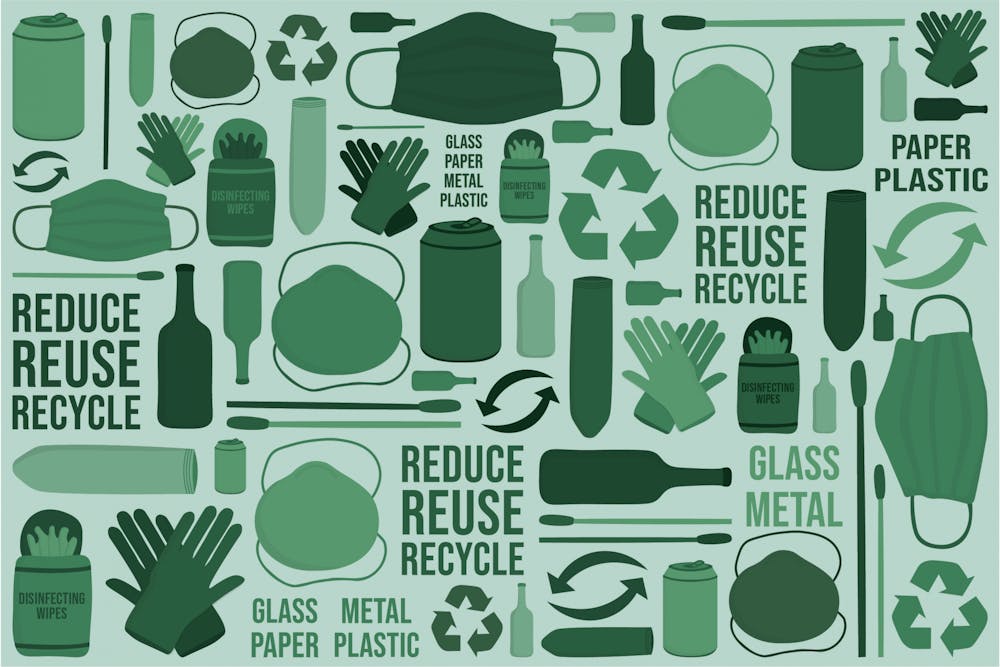Consider this a “wake-up call.”
Many thoughts and ideas surfaced this past year while reflecting on our world through the scope of a pandemic. Balance has been disrupted.
This has given way for leaders and citizens in our community to reevaluate and bring more attention to sustainability initiatives. Let’s start here in Columbia.
It is important to note the intersectionality of environmentalism and that the environment is tied to us as a human society, according to Grace Kazmierski, the assistant director for student engagement in the Office of Sustainability.
“Being able to recognize that we have an impact on the environment, just as the environment has an impact on us — I think has been a really interesting part of the pandemic,” Kazmierski said.
Kazmierski said COVID-19 has made time to rethink sustainability efforts.
“Instead of just doing business as usual, we’re able to think, 'OK, is this working?' If not, 'Why? What can we change?'” Kazmierski said.
Of the hot topics discussed in terms of change: How we use and produce our energy now that our lifestyles have changed, what the break in the economy means for carbon emissions and how we educate people to move forward for a sustainable future fueled by personal responsibility.
COVID-19 presented frustrating changes Kazmierski said are “a sign of the time,” not to mention the wildfires in California and the snowstorm that hit the South. The burden and anxiety of dealing with such problems have been noted in the growing generations, but Kazmierski said we all have the power to create change.
“Being able to be a change agent, to me, is the most empowering, and recognizing that the environment we live in, or the life we live in, would not exist without the environment the way that it is,” Kazmierski said.
COVID-19 seems to be a case of correlation, not causation — meaning, when the world was put on hold, the way we live was, too. We had some isolated time to step back and think: How is the way we continue to adapt to life going to affect our environment?
A key rise in sustainability conversation, third-year geography and global studies student Claire Windsor said, is the increase in intersectional awareness and heightened awareness around environmental racism.
“I think people on campus, too, are pushing those boundaries because they don’t see much action,” she said.
Windsor said she doesn’t think enough attention is paid to the environmental issues being debated in our backyards at the Statehouse.
“Anyone can have a role,” Windsor said. “All of us, each of us are constituents for these legislators.”
City of Columbia sustainability facilitator Mary Pat Baldauf said COVID-19 “sent a message that, you know, that change is possible.”
Baldauf emphasizes the importance of education: Learn what can and can’t be recycled, get involved with organizations in the community by putting "service above self," understand what you are investing in, take advantage of your role with the government and stop littering.
Columbia is pursuing the Sierra Club's Ready for 100 campaign, a national initiative for 100% clean energy by 2036. Mayor Stephen Benjamin signed this "tall order," Baldauf said, and it will take the whole community to make this landmark change. Richland County is also considering a ban on plastic bags.
The pandemic shifted the way we work and use energy daily. Energy use moved from powering office buildings to powering virtual home offices worldwide.
COVID-19 being a “fascinating test case” has left associate professor Conor Harrison of the Department of Geography and School of Earth, Ocean and Environment interested in how the pandemic has translated how we use our land, buildings and energy.
Harrison said there is a certain amount of energy use built into society, but we can change how we produce that energy to combat the climate crisis.
Harrison and Windsor are spearheading a divestment from the fossil fuels campaign. The Sierra Club Student Coalition has been investigating the university’s endowment and what investments they had in fossil fuel industries. According to Windsor, this is a grassroots campaign that has allowed student voices to “galvanize a really important movement” happening on campus and spark higher-level conversation in the faculty senate.
“It’s at least bringing up conversations about how the university is contributing to climate change without actually being the one producing those emissions,” Windsor said.
The university has seen an increase in student engagement, according to Kazmierski, and Windsor said there are many efforts in place to rethink the infrastructure of how we navigate powering the institution and even the transportation we use to get around. Harrison said one of the biggest changes we will experience in the next five to 10 years is electric vehicles, both for personal and business reasons. For now, biking has been a great alternative.
Looking broader, Columbia in general still has work to do. It comes down to responsibility and taking the extra step for our home and an enjoyable future.
“Overall, the message should just be to consume less, if possible,” Windsor said. “But also, when you do, just being environmentally conscious about what you’re doing.”
However, it goes both ways, Windsor said. Demanding changes at the top through political advocacy makes it easier for the individual and is more economically viable.
“You have to think about, 'What I can do,' but also questioning, 'Why is it not being done at a higher level?'” Windsor said.

